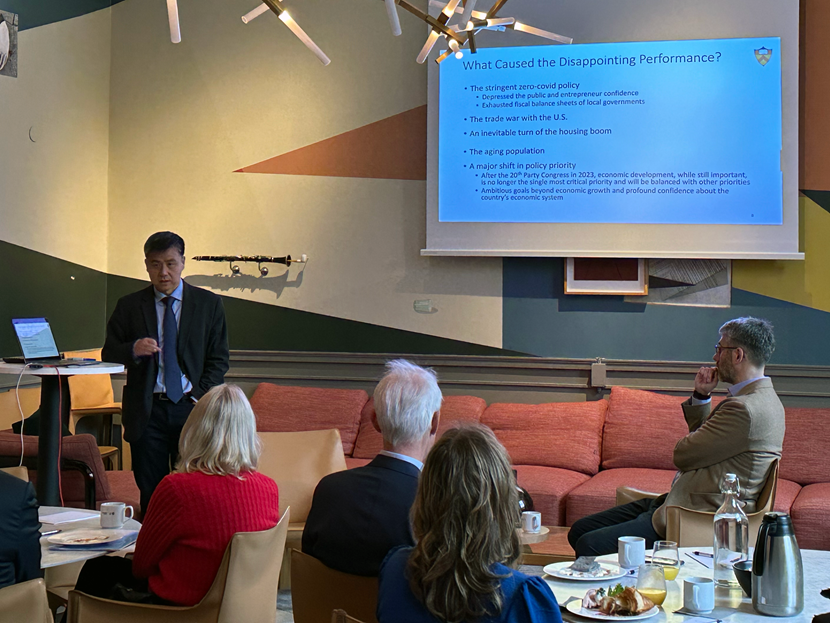Is this the End of China's Economic Growth Miracle?
apr. 29, 2024
Wei Xiong, a leading expert on capital market imperfections and the Chinese economy, joins SHoF's Bo Becker to discuss the driving forces behind financial market fluctuations, China's real estate trends, and financial stability.

As China grapples with a slowing economy and a tepid recovery from the COVID-19 pandemic, deeper economic fractures are beginning to show. Vital indicators like the Consumer Price Index (CPI) and Producer Price Index (PPI) are on the decline while export and import growth rates have stagnated.
Meanwhile, the world’s largest producer is contending with a burgeoning real estate crisis, escalating national debt, and a pivotal shift in government priorities — all under the shadow of a potential trade war with the US. In a Fireside Chat, Wei Xiong and Bo Becker, along with representatives of SHoF’s partner organizations and selected guests from the public sector, delved into these issues and their implications for global financial markets. Here is a summary of some talking points:
Underlying economic weakness
Despite three years of strict quarantine policies and expectations of a robust economic rebound, China's post-quarantine recovery has been lackluster. While the Gross Domestic Product (GDP) growth rate appears healthy at 5.2% last year and maintained the same pace in the first quarter of 2024, these figures belie underlying economic weaknesses.
“Beyond the GDP number, the bigger worry is other indicators are weak and weaker than people have been expecting. That's the main concern,” Xiong said.
Key measures such as the PPI have been negative for the past two years, and the CPI “has been bouncing around in negative territory”.
“This indicates something more uncertain underneath the GDP number,” he said.
Xiong added that despite traditionally being a cornerstone of China's economic growth, exports have faltered recently, impacted by trade tensions with the US. In 2023, both imports and exports registered negative growth, highlighting the challenges faced by China in maintaining its export-driven growth model amidst ongoing global trade disputes. This downturn in trade activities marks a significant shift from the past three decades of robust export-led expansion.
Real estate troubles
Real estate, often dubbed one of the three engines of Chinese growth, is in crisis. Investment in this sector rose steadily for a decade, peaking in 2021, but has since been declining. This downturn provides a clear indicator of the troubles facing the real estate sector, including high-profile struggles with bankruptcy among major developers like Evergrande and Country Garden.
China has been seeing a substantial housing bubble, characterized by overconstruction, particularly in smaller cities. Despite urbanization trends, which typically see migration from rural areas to major cities, these smaller cities have faced excessive building without the corresponding demand.
“China's real estate model is not really just about developers and the household buying homes,” Xiong said.
In China, local governments hold constitutional ownership of all land and heavily depend on land sales for revenue. In recent years, they have accrued significant debt, often secured by real estate assets, to finance infrastructure projects. This intertwining of local government finances with real estate markets makes resolving sectoral issues complex. If real estate prices were to crash, it could jeopardize local government financing and have broader economic impacts, complicating efforts to stabilize the market and address structural problems, he said.
Looking ahead: changing priorities
Over the past 30-40 years, China has undergone massive reforms, with economic development as the primary government focus. However, the current shift in policy priorities reflects a broader scope, integrating stability, national security, financial stability, common prosperity, and environmental concerns alongside economic growth. This transition marks a significant change from China's historical focus solely on economic metrics.
China's economy, a unique hybrid of a planned economy and free market principles, involves heavy state intervention alongside market mechanisms. This system, which has propelled China’s growth, is now adapting to address an array of modern challenges, including an aging population and demographic shifts that could lead to a shrinking workforce.
Amidst these changes, China is also attempting to pivot from an export-driven economy to one more reliant on domestic consumption and services. This includes a push towards newer industries like electric vehicles, battery technology, and green energy, though it remains to be seen if these sectors can fully compensate for the slowdowns in real estate and exports, Xiong said.
The shift in policy priorities from a single economic focus to a multifaceted approach introduces complexities in coordination among various levels of government, potentially impacting the efficiency of this transition. This policy evolution shows China's readiness to trade off some economic growth for broader societal goals, signaling a profound transformation in its developmental strategy.
"The current leadership views that after four decades of substantial economic development, there is now an opportunity to address some other important issues alongside economic growth,” Xiong said. This shift in policy priorities has introduced new challenges in maintaining China's economic growth.
